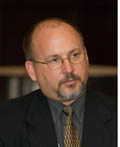From the Executive Director—May 2008
 Spring is here, and that means that “conference mode” is in full flower here at the Institute! Plans are coming along nicely for what promises to be a fantastic Metanexus Conference 2008 in Madrid, July 13-17. If you have not done so already, you can register for the conference online. Featured speakers include William Chittick, Hava Tirosh-Samuelson, Robert Kane, Nancey Murphy, Stanley Jaki, Le Ron Shults, Tariq Ramadan, Antje Jackelen, Basarab Nicolescu, Norbert Samuelson, Billy Grassie, and many, many more. We have a very special trip planned to Toledo on July 13, featuring Maria Rosa Menocal, George F.R. Ellis, and representatives of the world’s great faith traditions exploring together the possibilities for a new “golden age” of convivencia for Spain, for Europe, and for the world. You won’t want to miss it!
Spring is here, and that means that “conference mode” is in full flower here at the Institute! Plans are coming along nicely for what promises to be a fantastic Metanexus Conference 2008 in Madrid, July 13-17. If you have not done so already, you can register for the conference online. Featured speakers include William Chittick, Hava Tirosh-Samuelson, Robert Kane, Nancey Murphy, Stanley Jaki, Le Ron Shults, Tariq Ramadan, Antje Jackelen, Basarab Nicolescu, Norbert Samuelson, Billy Grassie, and many, many more. We have a very special trip planned to Toledo on July 13, featuring Maria Rosa Menocal, George F.R. Ellis, and representatives of the world’s great faith traditions exploring together the possibilities for a new “golden age” of convivencia for Spain, for Europe, and for the world. You won’t want to miss it!
The conference theme is Subject, Self, and Soul: Transdisciplinary Approaches to Personhood. The word “transdisciplinary” in the title signifies our belief that nothing as profound as the human person can be fully understood by the methodologies of any single science. In fact, the human person, in all its depth and mystery, probably cannot be fully understood at all. Our hope is to avoid reducing our understanding of ourselves in a monological manner to the language, say, of physics (however important physics is for understanding ourselves and our world). In a recent article, Stuart Kauffman writes against reductionism:
Biology and its evolution cannot be reduced to physics alone but stand in their own right. Life, and with it agency, came naturally to exist in the universe. With agency came values, meaning, and doing, all of which are as real in the universe as particles in motion. “Real” here has a particular meaning: while life, agency, value, and doing presumably have physical explanations in any specific organism, the evolutionary emergence of these cannot be derived from or reduced to physics alone. Thus, life, agency, value, and doing are real in the universe. This stance is called emergence. [T]here are explanatory arrows in the universe that do not point downward. A couple in love walking along the banks of the Seine are, in real fact, a couple in love walking along the banks of the Seine, not mere particles in motion. […] Emergence says that, while no laws of physics are violated, life in the biosphere, the evolution of the biosphere, the fullness of our human historicity, and our practical everyday worlds are also real, are not reducible to physics nor explicable from it, and are central to our lives.
A transdisciplinary approach aims at the real. It is a realism in a way that any reductionism, always a product of unbound reason, ultimately, is not. Whether Kauffman is right that it is we who have “invented God” or not, he is right that “the fact that we must live our lives forward into a ceaseless creativity that we cannot fully understand means that reason alone is an insufficient guide to living our lives. Reason, the center of the Enlightenment, is but one of the evolved, fully human means we use to live our lives. Reason itself has finally led us to see the inadequacy of reason. We must therefore reunite our full humanity. We must see ourselves whole, living in a creative world we can never fully know. The Enlightenment’s reliance on reason is too narrow a view of how we flourish or flounder.”
So, not by reason alone do we know and flourish, but also by the knowing that comes from the heart, that plumbs the depths of mystery inaccessible to the laws of nature. And by both, by head and heart, by reason and love, do we strive towards wisdom.
So let us seek wisdom together! Join with us at Metanexus as we pursue something like the whole story of the whole cosmos for the whole person!


